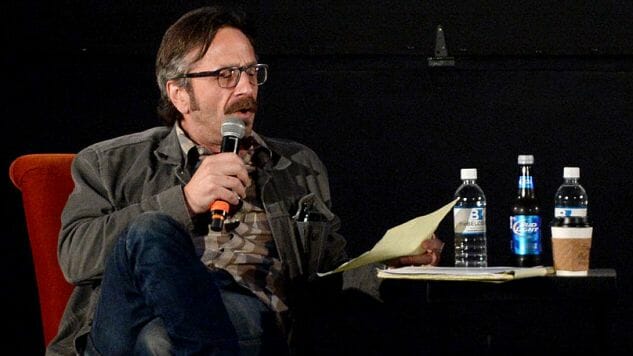The 25 Best WTF with Marc Maron Episodes
Main image courtesy of Getty Images
It’s been over six years since that New York Times article on WTF with Marc Maron, and looking back several of the points it makes are hilariously moot (“the interviews…often end up feeling more like therapy sessions”). At the time, WTF was blowing up thanks to its landmark interviews with Robin Williams, Louis C.K., Dane Cook and Carlos Mencia, as well as the appeal of its scrappy, DIY aesthetic, unedited format, confessional atmosphere and Marc Maron’s compelling comeback narrative. Comedy podcasting had been around for years, but WTF marked the start of its first great boom, one that Maron still reigns over as an exhausted, cranky Uncle-King.
But for a podcast that’s so heavily associated with a few key elements, WTF has actually lived a couple of different lives. The first year of the podcast drew heavily on Marc’s radio background (its now pretty off-brand title reflects this), before finding its footing with the loose, vulnerable interviews that made it famous. Then you have a first victory lap of high profile guests, Obama, a second victory lap of high profile guests, an expansion into the worlds of music, film, theatre, and show-business history, and finally the show’s current incarnation, which features a shorter secondary interview that lets someone plug an upcoming project.
WTF’s old allure as a place where stars get vulnerable and raw is now the industry standard. Our mutual understanding that it’s perfectly acceptable (and actually expected) that people will overshare (one that WTF helped foster) has long since pushed Maron to move beyond “we good?” and find new ways to engage with guests he doesn’t have a rocky past with. Furthermore, while the idea of Maron as some washed up has-been is laughable now (watch GLOW, available June 23rd on Netflix!), his success has been as problematic for Maron as his failures were. As a result, each phase contains a ton of incredible interviews. As Maron continues to clock in over 800 episodes with no sign of slowing down, here are our top twenty-five.
25. #413: Bill Hader
Don’t get too complicated! Sometimes you just need a good “How I Got Famous But Stayed A Good Guy” story, and Bill Hader’s is the best. He walks us through his weird PA jobs (especially the time Marty Kove from The Karate Kid was a real dick to him) and early sketch experiences through his SNL audition, highlighting how even after he was on the show he didn’t feel comfortable for several years. Toss in a Lorne story, sure. Toss in some great off-the-cuff voice acting, why not. Give the people exactly what they want and need, and do it without trying or batting an eye, just like Bill Hader.
24. #479: Lena Dunham
It has become way to common to dismiss Lena Dunham as a privileged Oberlin kid who had an HBO show handed to her. Those concerns are laid to rest completely in her conversation with Maron (who also has another excellent episode with Dunham’s collaborator and mini-Maron Alex Karpovsky). I’ll be the first to admit that sometimes Dunham’s public statements that result in some kind of public apology can be hard to whole-heartedly defend, even if, like me, you consider yourself a fan of her work. But she’s at the top of her game here, breaking her accomplishments, mistakes, ambitions and the criticisms levied against her with insight beyond her years. If you’re on the fence and want to hear Dunham talk openly without worrying about some kind of backlash, this is the place.
23. #621: Ian McKellen
Sometimes “great actor” episodes of WTF can be a little tedious when it feels like the actor in question is excited to have an episode of WTF but then becomes reticent or unwilling to play ball. No one is more willing to play ball than Ian McKellen, who quickly commandeers the interview to great effect. He wastes no time in trying to get Maron to appreciate Shakespeare, culminating in a breathtaking moment when McKellen recites a monologue from Sir Thomas More (the only selection of any play that exists in Shakespeare’s handwriting) for an audience of one. It does the trick.
22. #711: Chris Gethard/Quincy Jones
Gethard has always been a scrappy underdog, and he fully admits to Marc that it’s a big deal for him to be on this podcast. However, in telling Maron his life story, you can hear Gethard passionately resolve to stick to his guns and the weirdo ideals of The Chris Gethard Show no matter how nervous the situation may make him. He’s a motormouth in this episode, which distinguishes itself from other tellings of Gethard’s career path when he goes on a tear of excellent stories from his time working for Weird NJ—Marc is even able to get in on it due to his personal connection with the area. No one is more deserving of the moment Gethard is having right now, but this interview was recorded just before he really started picking up speed, and it’s therefore deeply satisfying for everyone when Maron communicates how much respect he has for him.
-

-

-

-

-

-

-

-

-

-

-

-

-

-

-

-

-

-

-

-

-

-

-

-

-

-

-

-

-

-

-

-

-

-

-

-

-

-

-

-








































